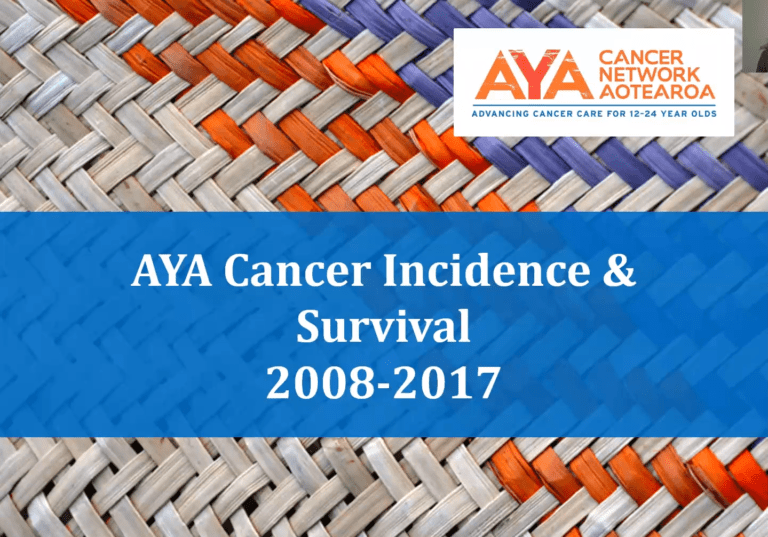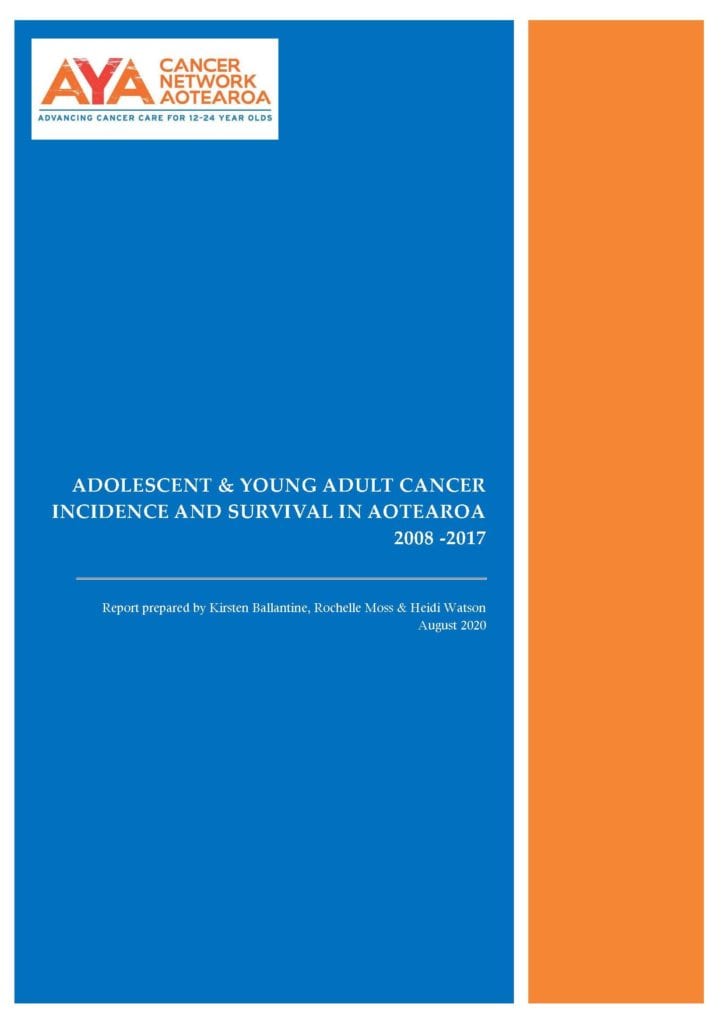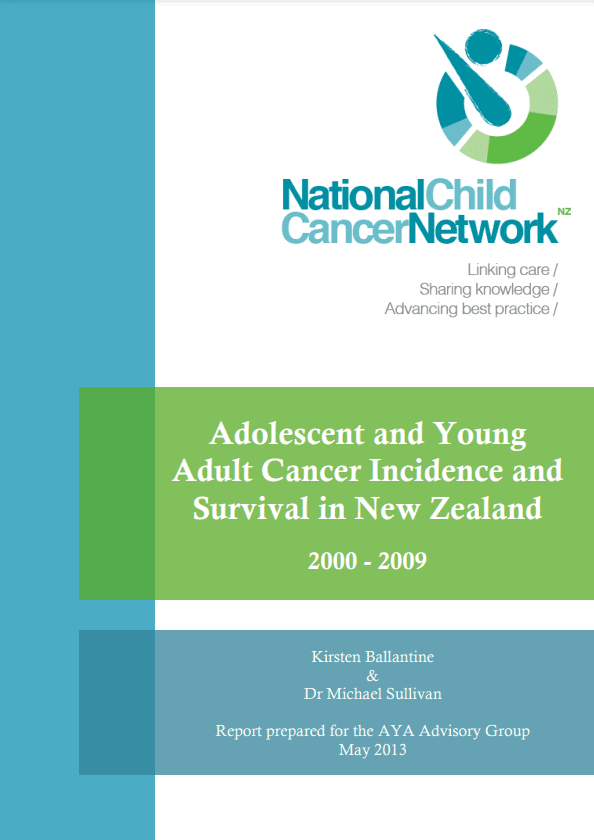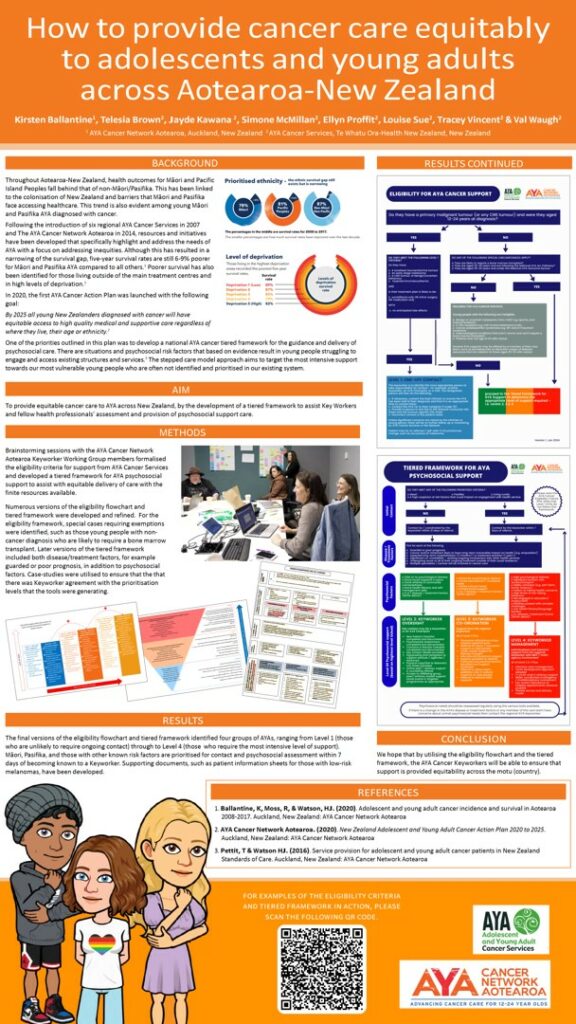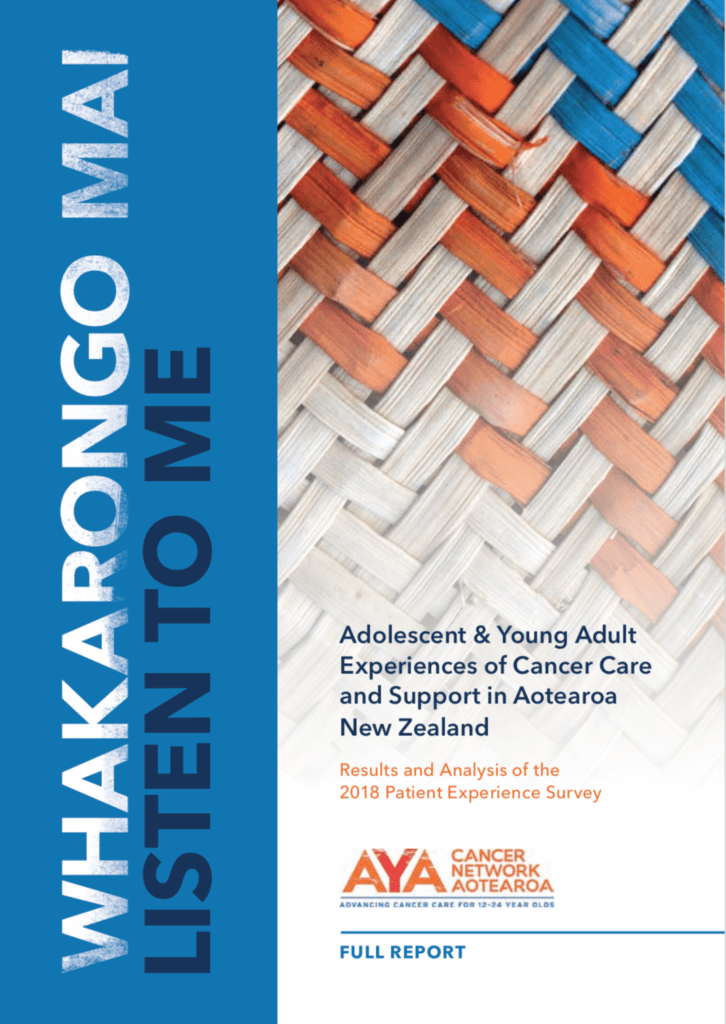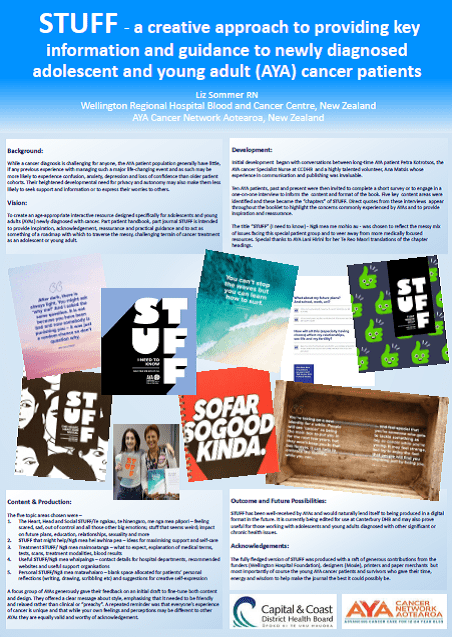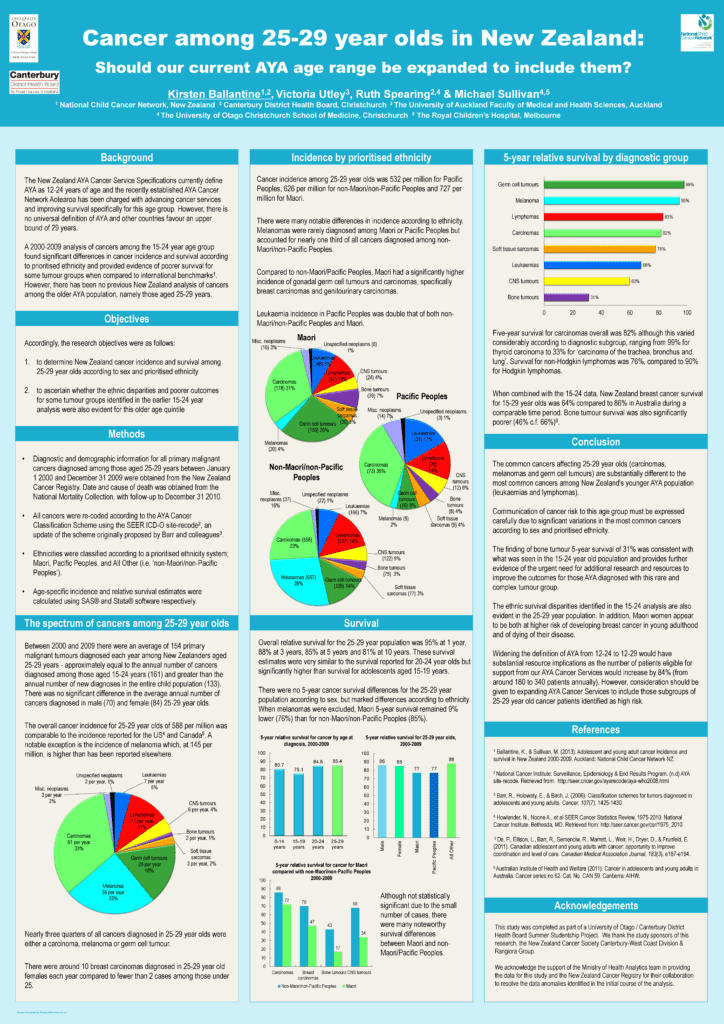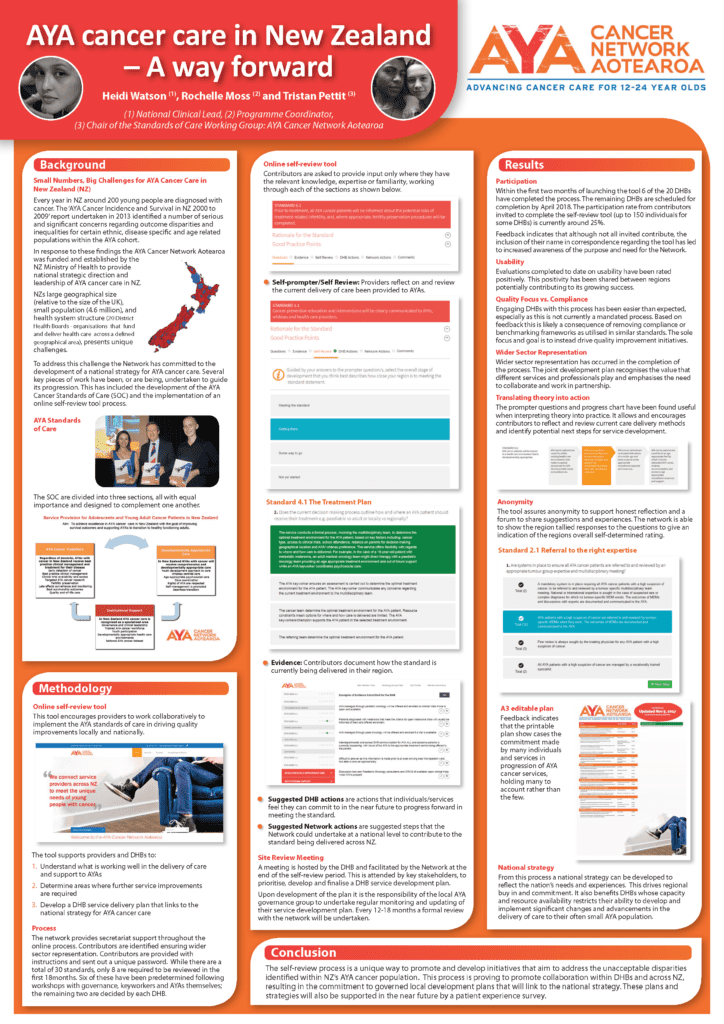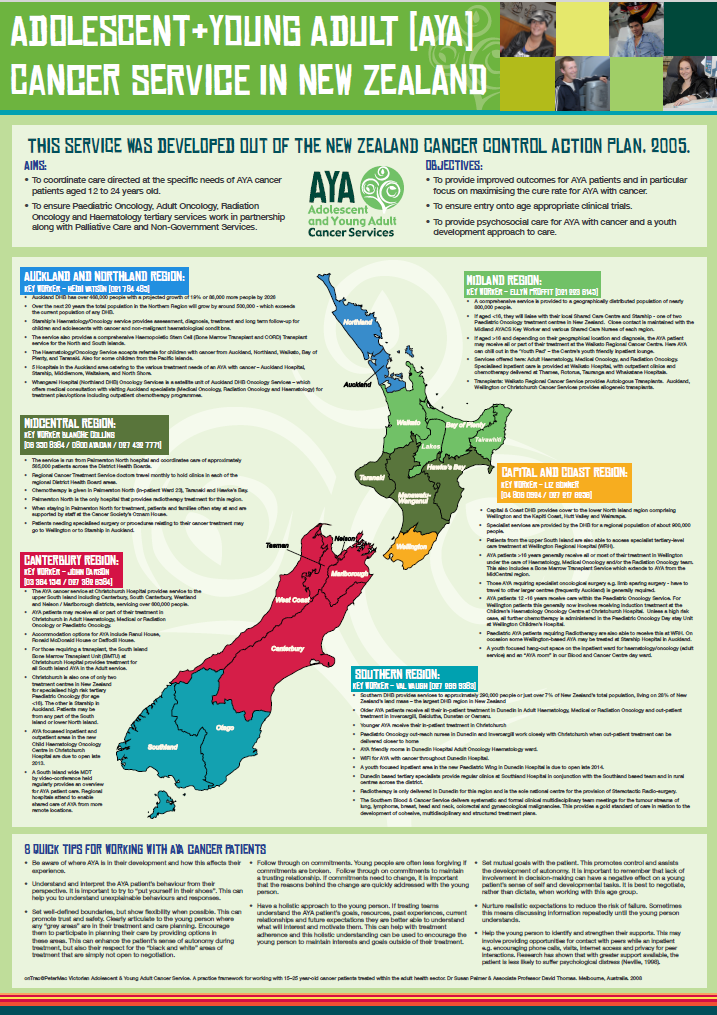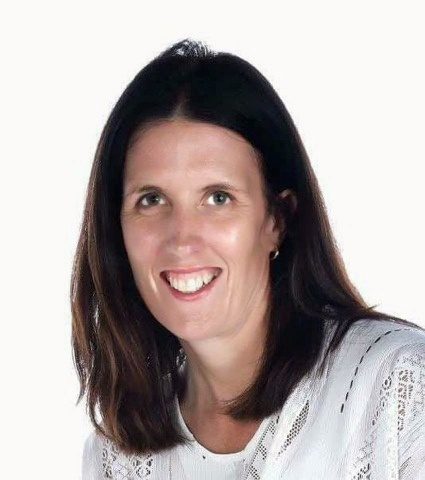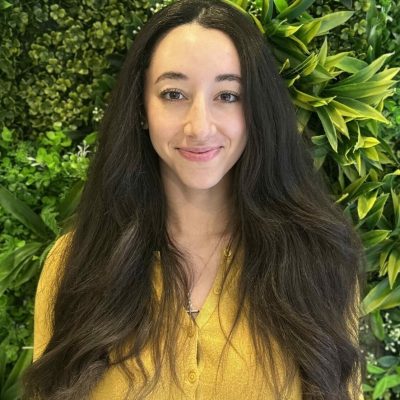AYA Cancer Network Resources
AYA cancer research is essential for improving long-term outcomes for AYAs with cancer and reducing inequalities. The AYA Cancer Network is keen to promote cross-sector awareness of AYA cancer research. Greater collaboration encourages the cross-pollination of ideas and leads to better prioritisation and utilisation of scarce research resources. The Network is also mindful that rangatahi with cancer are a small population and we want to protect them from the burden of being contacted by multiple research teams in a short space of time.
If you are interested in conducting research involving young people with cancer then please get in contact with us. We are keen to support research of all types and at all stages by:
- Suggesting possible research questions
- Providing feedback on your research proposal
- Connecting you with other researchers who are interested in a similar area
- Helping you recruit study participants through our existing contacts
- Sharing your study findings and outputs with the AYA community
Kirsten Ballantine
National Programme Manager
kirsten.ballantine@cdhb.health.nz
AYA Cancer Research Project Directory
The AYA Network has developed an AYA Cancer Research Project Directory that includes research projects that the Network is undertaking in our own priority areas as well as other studies that we support. If you would like to know more about a particular project then please click on the headings below. And if you know of any other current New Zealand studies involving AYA cancer patients that aren’t listed here, then please let us know at AYACancer@adhb.govt.nz
Clinical trials allow researchers to test new treatments or existing treatments given in new ways that could improve patient outcomes. At any time there are a number of cancer clinical trials open in sites throughout the country, many of which are international collaborative studies. The AYA age group may be eligible for both paediatric and adult clinical trials.
If you are a young person recently diagnosed with cancer you can ask your regional AYA Key Worker or your lead clinician about whether there are any clinical trials that might be available for you.
If you are a health professional and interested in learning more about the clinical trials that are currently available for AYA cancer patients please contact the AYA Cancer Network here: AYACancer@adhb.govt.nz
Research such as tumour biology studies, registries and tissue banking allow us to learn more about the molecular and genetic basis of cancers which can help prevent, diagnose and treat these cancers more effectively in the future. They are sometimes referred to as observational or descriptive studies as – unlike clinical trials – these types of studies don’t involve the participants testing an intervention such as a new medicine or a different way of treating their illness.
One such study that New Zealand AYAs and health professionals are currently contributing to is the Australasian Oncofertility Registry Study. This study monitors the referral patterns and the uptake, quality and complications of fertility preservation strategies in New Zealand. Patients from 0-25 years are eligible for the registry components of this study.
If you are a health professional and interested in learning more about the biology and registry studies that are currently available for AYA cancer patients please contact the AYA Cancer Network
Title | What barriers do AYA cancer patients in Aotearoa face during survivorship? |
Coordinating Investigator | Dr Tristan Pettit, Children’s Haematology Oncology Centre, Christchurch Hospital
|
Start & End Date | October 2020 – July 2022 |
Current Status | Completed. Journal manuscript accepted and publication pending. |
Synopsis | The study aims to determine the extent and nature of AYA survivorship barriers that are experienced by AYA cancer survivors. The online survey covers questions related to whether or not the young person experienced survivorship barriers and whether they sought and received help from their health provider to resolve the specific survivorship issue. The results will be used to inform and tailor survivorship care in the future. |
Study type | Online survey |
Number of participants | Over 200 respondents nationally (AYA diagnosed between 2010 and 2019, aged 15-24 at the time of their diagnosis) |
For further information contact | Dr Tristan Pettit: Tristan.Pettit@cdhb.health.nz |
Title | A gamified digital intervention to improve the psychosocial and mental wellbeing of adolescents who are socially isolated due to prolonged hospitalization with significant illnesses |
Coordinating | Dr Simon McCallum, School of Engineering and Computer Science, Victoria University of Wellington |
Current Status | Participant recruitment |
Start & End Date | July 2021 – June 2024 |
Synopsis | This purpose of this research project is to develop and pilot a gamified digital intervention to improve the psychosocial and mental wellbeing of adolescents who are socially isolated due to prolonged hospitalization with significant illnesses such as cancer. Phase One of the study will involve an online survey of relevant health professionals aimed at gaining background knowledge and gathering requirements for the development of the intervention. The second phase will be the development and piloting of the gamified digital intervention. |
Research type | Intervention pilot, online survey and focus groups |
Number of participants | TBA |
For further information contact | Dr Simon McCallum: simon.mccallum@vuw.ac.nz |
Title | A qualitative study exploring views of an online acceptance and commitment therapy intervention for AYA cancer survivors |
Coordinating | Dr Anna Serlachius, University of Auckland Department of Psychological Medicine |
Start & End Date | January 2022 – June 2023 |
Current Status | Participant recruitment |
Synopsis | Completing cancer treatment is by no means the end of challenges for rangatahi and without appropriate support there is increased risk of reduced quality of life and significant distress. There is very little research on developing supportive interventions for AYA cancer survivors, especially in Aotearoa. The study will gather feedback from rangatahi cancer survivors, their whānau and health professionals on the proposed online Acceptance and Commitment Therapy intervention. The aim is to gather views on the acceptability, feasibility, and suitability of the proposed intervention. This is an opportunity to better understand their needs and co-design a tool to support their wellbeing. By involving those who will be using this program their voices will be included in the end design ensuring it is relevant to rangatahi in Aotearoa and can significantly improve their outcomes. The study was awarded an Auckland Academic Health Alliance Centre for Cancer Research Grant in November 2021 and is a partnership between the University of Auckland, the AYA Cancer Network Aotearoa and the National Hauora Coalition. |
Study type | Intervention pilot, online focus groups |
Number of participants | 15 rangatahi cancer survivors, 15 whānau, and 15 health professionals. |
For further information contact | Dr Anna Serlachius: a.serlachius@auckland.ac.nz |
Title | Timelines to diagnosis for New Zealand AYA cancer patients with analysis of potential associations between timeline and outcome |
Lead | Tristan Pettit, Consultant, Children’s Haematology & Oncology Centre, Christchurch |
Current Status | Study design phase |
Start & End Date | Dec 2022 (provisional) – Dec 2027 |
Synopsis | New Zealand AYAs have been shown to have poorer survival when compared to younger child cancer patients with the same diagnosis, and when compared to similar age matched cohorts from overseas. Internationally, delays in diagnosis have been widely published as an important prognostic factor for AYA cancer patients. Available New Zealand AYA cancer data on this issue is lacking. In 2018 the South Island AYA Cancer Service published the results of a study that compared timelines to diagnosis for paediatric, AYA and adult patients with lymphoma and sarcoma. Overall, it was found that AYA patients had a significantly longer time to diagnosis and treatment onset than paediatric patients with the same diagnosis.
This study aims to investigate timelines to diagnosis for NZ AYA patients across the whole country, with enrolment over three years to ensure a large sample size. Patient follow up will be for a minimum 2 years, with the study closing after a total of 5 years. Outcome data will be collected (e.g. relapse, mortality) and analysis will be undertaken to investigate association with time to diagnosis. The dataset will be compared to similar data from age matched cohorts from other countries. National analysis will be undertaken to highlight areas where targeted interventions are required. |
Research Type | Questionnaire / interview & medical records review |
Number of participants | Approximately 300 respondents nationally |
For further information contact | Dr Tristan Pettit: Tristan.Pettit@cdhb.health.nz |
Title | Symptoms and side effects: Defining priorities in cancer symptoms for paediatric and AYA patients: An Australian / New Zealand modified Delphi study |
Coordinating | Dr Ross Drake, Starship Paediatric Palliative Care Service |
Current Status | Research approvals granted. Study about to commence. |
Start & End Date | July 2022 – Dec 2023 |
Synopsis | This Australasian study aims to garner a consensus of the symptoms that are most important for young people with cancer and identify those that are in need of further support and research throughout the cancer trajectory.
This study will use a modified Delphi approach and will include surveys of young people, their caregivers and the oncology and palliative care healthcare professionals that look after them. The final round will be consensus-building meetings conducted via video conferencing. The consensus of the most troubling cancer-related symptoms will give direction and focus for future resources, research and high-quality clinical trials. |
Research Type | Modified Delphi study |
Number of participants | Approximately 15 AYA, 15 paediatric patients and their caregivers, and 15 clinicians involved with paediatric / AYA cancer care. |
For further information contact | Dr Ross Drake: RossD@adhb.govt.nz |
Past Projects
- University of Otago Summer Studentships: Nov 2017 – Feb 2018. “Diagnostic Delay in AYA Lymphoma patients – Does it exist and what are the contributing factors?”
- Contact Person: Dr Tristan Pettit – tristan.pettit@cdhb.health.nz
- Delivered dose intensity of curative-intent chemotherapy for Adolescent and Young Adult (AYA) osteosarcoma patients in Auckland, New Zealand – A retrospective audit.”
- Contact Person Dr George Laking – GeorgeL@adhb.govt.nz
- University of Otago Summer Stundentship: Nov 2016 – Feb 2017. “Diagnostic Delay in AYA Sarcoma patients – Does it exist and what are the contributing factors?”
- Contact Person: Dr Tristan Pettit – tristan.pettit@cdhb.health.nz
- The Sexual Health Concerns and Sexual Health Education Needs of Adolescents with Cancer.
- Contact Person: Louise Sue – Louise.Sue@cdhb.health.nz
- What factors are associated with successful adherence to oral treatment for CML?
- Contact Person: Simone McMillan – SMcMillan@adhb.govt.nz
- Does the metaphorical conversation ‘Te Awa’ assist young people traverse their cancer journey?
- Contact Person: Ellyn Proffit – Ellyn.Proffit@waikatodhb.health.nz
- Does massage therapy improve symptom management for children and adolescents with cancer.
- Contact Person:Tracey Vincent – TraceyV@adhb.govt.nz
Future Research Project Ideas
Perhaps you need to undertake a research project to fulfil your clinical training programme requirements or as part of your post-graduate study.
If you are interested in AYA cancer and looking for a potential project topic, a great place to start is our AYA Cancer Action Plan. Reading through the Action Steps of our 18 current priorities, you’ll see a wide range of issues for AYAs that would benefit from closer study and recently-implemented initiatives that haven’t yet been evaluated. For example, a qualitative researcher might be keen to partner with the Network to conduct interviews with whānau about how they can be better supported while their AYA child/partner/sibling is undergoing cancer treatment (Priority 8). Or a clinician might want to undertake an audit at their centre to determine how consistently the ‘national guideline for optimal procedural analgesia and sedation for AYA cancer patients’ is being followed (Priority 1).
If you have a research topic in mind (or even if you don’t just yet!) that has the potential to improve the cancer care for AYAs then please get in touch with us.
Kirsten Ballantine
Research & Data Lead
AYA Cancer Network Aotearoa
kirsten.ballantine@cdhb.health.nz
AYA Cancer Incidence and Survival
Kirsten Ballantine, our Data Projects Lead has produced a webinar to provide a little more detail about the main findings from the AYA Cancer Incidence and Survival in Aotearoa 2008-2017.
AYA Reports and Presentations
Journal Publications
Many New Zealand clinicians and researchers are actively involved in AYA cancer research. Here we celebrate AYA research that has recently been published in New Zealand and international peer-reviewed journals.
2025. Jason Gurney, Kirsten Ballantine, Annie Chiang, Anna Davies, Chris GCA Jackson, Jonathan Koea, James Stanley, Scott Macfarlane, Child and adolescent/young adult cancer incidence and survival for Māori in Aotearoa New Zealand, Cancer Epidemiology, Volume 97
2021. Kim D, Moss R, Gooder C, Lee C, Watson H, Pettit T. 2021. Health professionals’ self-identified knowledge, barriers and educational needs regarding identification and management of adolescent and young adult cancer in New Zealand. The New Zealand Medical Journal.
2019. Pettit T, Sue L, Waugh V, et al. 2019. An age stratified analysis of the access to care continuum across three tumor groups: are there delays for AYA? Journal of Adolescent Young Adult Oncology.
2018. Ballantine K, Utley V, Watson H, Sullivan M, Spearing R. 2018. The burden of cancer in 25–29 year olds in New Zealand: a case for a wider adolescent and young adult age range? The New Zealand Medical Journal.
2018. Watson H, Moss, R. 2018. Adolescent and young adults with cancer in New Zealand: Understudied and under-served. The New Zealand Medical Journal.
2017. Ballantine K, Watson H, Macfarlane S, et al. 2017. Small Numbers, Big Challenges: Adolescent and Young Adult Cancer Incidence and Survival in New Zealand. Journal of Adolescent and Young Adult Oncology.
2013. Yallop K, McDowell H, Koziol-McLain J, et al. 2013. Self-reported psychosocial wellbeing of adolescent childhood cancer survivors. European Journal of Oncology Nursing.

